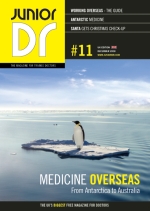Despite it now being November, and supposedly Spring, we are once again socked in by strong winds and snow today. Sitting as I do now, looking through my bedroom window, I can make out the rocks east of the base disappearing into uniform whiteness about 50m away, with streams of blown snow snaking across towards me before passing under the base. Over the sound of my music, the wind is rumbling and singing in the support beams, and every now and then a strong gust makes a shiver through the structure that I can feel through my feet.
Today I am feeling lazy and doing relaxed things. This includes reading some medical papers, catching up on email and keeping my nose in various books (simultaneously reading a PG Wodehouse and one of Reinhold Messner’s books). I should be working on the month-end reports and newsletter for October… but hey, it’s Saturday 😉
I slept in short bursts last night – one of the team has a fairly nasty case of solar keratitis (snow-blindness) from working outdoors yesterday without his sunglasses, and I was up every few hours last night to put in the right drops (three different types) and give him pain medicine. This is the first case of snow-blindness we’ve had. It was heavily overcast yesterday, which fooled this poor character into thinking that his goggles/glasses were superfluous (it’s always an irritation to wear eye protection when doing strenuous work, because it invariably fogs and then freezes, requiring regular cleaning). However, the UV rays that do the damage pass through the clouds and reflect off all the snowy surfaces potently. The good news is that the corneal damage is not severe, and I expect a full recovery in a day or two, but in the meantime it is very painful, irritating, and debilitating.
We can certainly feel that the Earth is progressing on her path around the sun. Temperatures have increased and over the last week or two have hovered in the minus teens, as opposed to the minus twenties and thirties we are used to. The sun is nearly a perpetual companion now: sunrise is now just after 2 AM and sunset just before 10 PM. As the sun never gets far below the horizon, even at midnight there is a blue twilight which allows one to work easily outdoors, and the southern horizon has a bright yellow-orange glow. On a day like today, with such limited visibility and everything white outside, when I woke at 0300 to give medications there was no way to tell if it was 0300, 0900 or 1200 other than looking at my watch.
The longer hours of daylight and warming temperatures have made a big difference in our outdoors productivity, thankfully. Work is under way to remove the wreckage of the HF radar which fell during the winter to make way for a new construction during the summer. This is slow going, as each of the 15 16m T-shaped towers have to be lifted from their covering of hard-packed snow (accumulated over the past few months), unbolted, placed on a sled, and deposited in the summer depot near the base. We have also moved all the 25 000 litre diesel transport tanks up to the depot and pumped out the remaining fuel stocks into our storage bladders, to prepare the tanks for our coming trip to the coast. Also very importantly, last week we prepared our skiway to receive flights – the local DROMLAN (Dronning Maud Land Air Network) flights to move supplies and personnel for the summer kick off now. SANAE IV is fairly centrally located in the DROMLAN area, and thus we serve a role as a way station, and perform flight following. We almost had 15 Germans and additional flight crew here for the weekend, but the weather closed in before the flight took off. It would have been good fun to have company, as they would be the first outsiders we’ve seen since the beginning of March. They also have some long-awaited packages of personal goodies for the team, which are subject of much anticipation!
People frequently ask me if I’m excited about the prospect of coming home; with our return only a little more than 4 months away now and expecting the takeover/summer-expedition personnel in about 9 weeks I certainly have a feeling that the expedition is coming full circle and the end is approaching. Although I recognise home-sickness in some of my team-mates and I do long for some simple things (fresh salad; the heat of a sunny Cape day on bare skin; a swim; petting and playing with the dog; flying my glider), moving into this phase fills me with more of a sense of sadness than joy or relief. To those back home this might sound heartless, but it is due to the immense sense of belonging and peace that I feel in this wild place. Sometimes, when I find myself outdoors on my own for a moment, just sucking in a deep chestful of the cold, clear air fills me with satisfaction akin to Nirvana. It is said that religions are born in the desert, because the emptiness makes Man mindful of the presence of something greater. Here, in this unique desert, I feel that sensation acutely, and thus the sadness when I think of going home. I’m certainly not the first to feel this way: Frank Hurley, of Shackleton’s epic expedition, wrote that “After life in the vastness of a vacant continent, civilisation seemed disappointingly narrow, cramped, superficial and empty.“ However, to return is inevitable and the reunion with loved ones and loved things will be sweet. I take heart in the words of TS Elliot:
“We shall not cease from our exploration,
And the end of all our exploring
Will be to arrive where we started
And know the place for the first time.”
